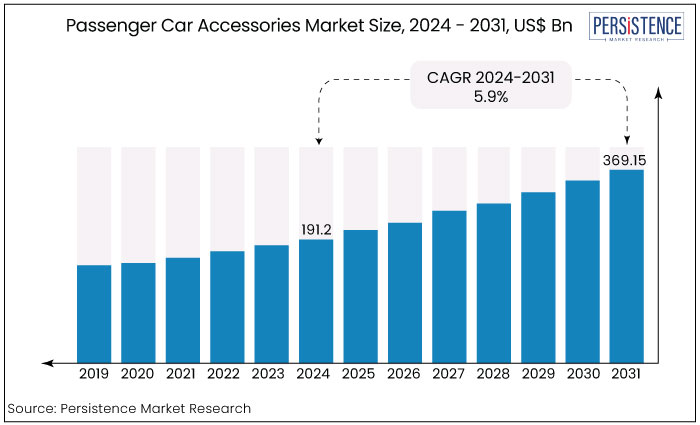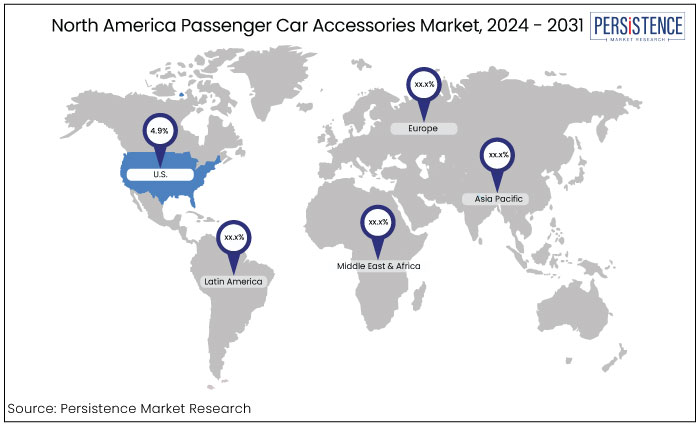Industry: Automotive & Transportation
Published Date: October-2024
Format: PPT*, PDF, EXCEL
Delivery Timelines: Contact Sales
Number of Pages: 173
Report ID: PMRREP11416
The passenger car accessories market is estimated to increase from US$ 191.2 Bn in 2024 to US$ 369.15 Bn by 2031. The market is estimated to record a CAGR of 5.9% during the period from 2024 to 2031.

Key Highlights of the Market
|
Market Attributes |
Key Insights |
|
Market Size (2024E) |
US$ 191.2 Bn |
|
Projected Market Value (2031F) |
US$ 369.15 Bn |
|
Global Market Growth Rate (CAGR 2024 to 2031) |
5.9% |
|
Historical Market Growth Rate (CAGR 2019 to 2023) |
2.3% |
|
Country |
CAGR through 2031 |
|
U.S. |
4.9% |
The aftermarket for passenger car accessories in North America is anticipated to experience significant growth throughout the forecast period. This sector is vibrant and growing, primarily fueled by high vehicle ownership rates and a strong consumer preference for vehicle personalization.
The U.S. leads the market accounting for about 85.1% of the share followed by Canada and Mexico. With over 276 million registered vehicles, as reported by the Federal Highway Administration, the U.S. provides a vast customer base for aftermarket products.
The U.S. market is projected to expand at a 4.9% CAGR between 2024 and 2031. American consumers increasingly seek accessories that improve aesthetics, comfort, and entertainment reflecting a robust trend toward vehicle customization.

Europe passenger car accessories aftermarket holds a notable yet secondary position in the global landscape. With over 242 million registered passenger vehicles in the European Union (EU) as of 2021, the demand for vehicle accessories remains notable. This demand stems from consumers’ growing desire for customization, the prevalence of an aging vehicle fleet, and an increasing focus on performance enhancements and aesthetic upgrades.
Prominent players in this market include Thule Group and Lund International from Sweden, along with Mont Blanc Industrie from France, who dominate the aftermarket sector. Additionally, stringent EU regulations regarding vehicle accessories ensure safety and quality significantly impacting market dynamics.
Industry associations like CLEPA and AASA promote innovation and growth aligning market trends with regulatory standards further driving the expansion of this sector.
|
Category |
CAGR through 2031 |
|
Sales Channel - OEMs |
10.4% |
Buyers are increasingly gravitating toward original equipment manufacturers (OEMs) driven by brand loyalty and established trust in the passenger car accessories market. The market is projected to expand at an impressive 10.4% CAGR through 2031.
Consumers opt for OEM products primarily due to their reputation for reliability and high quality, which ensures excellent performance and perfect compatibility with their vehicles. This preference is rooted in OEMs’ long-standing track record of excellence and consistency in providing top-tier accessories.
As consumers place a premium on reliability and peace of mind regarding their purchases, OEMs reinforce their crucial role in the market firmly establishing themselves as the go-to choice for discerning buyers seeking superior passenger car accessories.
|
Category |
CAGR through 2031 |
|
Type - Interior Parts |
5.6% |
Buyers are increasingly favoring interior parts over other types reflecting a notable trend in the car accessories market. The market is projected to expand at a 5.6% CAGR during the period from 2024 to 2031.
Consumers are keen on products that enhance the comfort and functionality of their vehicle interiors, ranging from stylish seat covers to sophisticated entertainment systems. These accessories not only serve to personalize the driving experience but also enhance the overall aesthetics of the car's interior space.
Prioritizing the creation of a cozy and enjoyable atmosphere, interior accessory parts have emerged as the top choice among consumers. As preferences shift, manufacturers are actively innovating and expanding their product lines to address the growing demand for high-quality interior car accessories.
The passenger car accessories include items such as floor mats, seat covers, infotainment systems, and safety features that cater to the diverse needs of consumers. The market operates through manufacturers, retailers, and online platforms that distribute these products to end-users.
Accessories serve various purposes including improving the driving experience, providing additional safety, and personalizing vehicles to reflect individual tastes. As car ownership continues to rise globally, the demand for innovative and quality accessories is expected to grow driving market expansion.
The sector is experiencing passenger car accessories market trends driven by technological advancements and changing consumer preferences. There is a notable shift toward smart and connected accessories, such as advanced infotainment systems and smartphone integration features catering to tech-savvy customers.
Sustainability is also becoming a focal point with an increasing demand for eco-friendly materials and products. Customization is on the rise as consumers seek to personalize their vehicles. Additionally, the trend toward e-commerce is reshaping distribution channels. These trends suggest a dynamic market that is evolving to meet modern consumer demands.
The passenger car accessories market exhibited of a 2.3% CAGR during the period from 2019 to 2023. This slow growth can be attributed to various factors including economic fluctuations, changing consumer priorities, and the impact of the COVID-19 pandemic, which led to reduced vehicle sales and consumer spending on non-essential items.
The market is poised for a significant turnaround as the automotive sector recovers and adapts to new consumer trends.
The market is projected to expand at a 5.9% CAGR during the period from 2024 to 2031. This anticipated growth is fueled by increasing disposable incomes, rising car ownership, and an emerging focus on vehicle customization and technology integration.
Consumers increasingly seek enhanced driving experiences, opening several market opportunities for innovative accessories. Additionally, the shift toward e-commerce platforms is expected to improve accessibility and convenience for consumers. As these trends evolve, the industry shows promising growth with a vibrant future characterized by innovation and sustained growth.
Innovations in Lightweight Materials
Manufacturers are developing lightweight materials for passenger car accessories to cater to the growing demand for fuel-efficient and light vehicles. For example, high-strength steel and thermoplastic have become the main raw materials used in the production of automotive accessories.
Various regions must adhere to stringent regulations to ensure that automotive accessories are replaced after their designated lifespan. The National Highway Traffic Safety Administration (NHTSA) has introduced new standards for auto parts including tires, rims, and seat belts, which dictate that these components must be originally manufactured and replaced according to their longevity. Such regulations are expected to drive passenger car accessories market demand.
Rising Demand for Customization
Contemporary vehicles generally come equipped with a fundamental infotainment system that features a CD player, Bluetooth connectivity, USB port, lighter port, aux input, video display, radio, GPS, multiple speakers, and control panels.
Infotainment systems are becoming increasingly prevalent in advanced vehicles including connected and autonomous models. Investments from automakers and technology companies are likely to boost the infotainment market further.
The rise in smartphone usage and the widespread availability of high-speed internet have enhanced connectivity driving demand for these systems. Original Equipment Manufacturers (OEMs) are now introducing advanced infotainment systems in mid-range and compact car segments. The luxury car market is also seeing a growing adoption of these technologies.
Consumers are increasingly focusing on the aesthetics of their vehicles with disposable income rising globally leading to a surge in vehicle customization. Enhancements such as chrome accessories, spoilers, LED lights, and alloy wheels are popular choices that improve a vehicle's visual appeal. Consequently, the passenger car accessories market expansion is experiencing significant growth globally.
Economic Uncertainty Poses a Significant Challenge
Economic uncertainty poses a significant challenge to the sales of passenger car accessories. Fluctuating economic conditions can lead to reduced consumer spending, as individuals prioritize essential expenditures over discretionary purchases such as automotive accessories.
Consumers may delay upgrading or personalizing their vehicles during periods of economic downturn opting instead to maintain their existing accessories or forgo enhancements altogether. This cautious spending behavior can adversely impact sales and growth within the market, making it difficult for manufacturers and retailers to achieve desired revenue levels and invest in new product development.
Regulatory Challenges Remain a Key Barrier
Regulatory challenges can impede the passenger car accessories market growth as manufacturers must navigate a complex landscape of safety and environmental standards. Compliance with these regulations often requires significant investment in research, development, and testing, which can be a financial burden particularly for small companies.
Stringent rules regarding material safety, emissions, and product quality can limit the types of accessories that can be produced or sold. These challenges may deter innovation and slow down the introduction of new, advanced products into the market ultimately affecting overall market expansion.
Integration of Smart Technology
One significant future opportunity in the the passenger car accessories market expansion lies in the integration of smart technology into automotive products. As vehicles become increasingly connected through the Internet of Things (IoT), there is a growing demand for accessories that enhance connectivity and user experience.
Innovations such as smart infotainment systems, advanced navigation tools, and voice-activated controls are poised for widespread adoption.
Manufacturers can capitalize on this trend by developing accessories that seamlessly integrate with smartphones and other devices, offering features like real-time traffic updates, remote vehicle diagnostics, and personalized entertainment options. This shift toward smart accessories not only enhances the driving experience but also positions manufacturers to tap into the lucrative tech-savvy consumer segment driving market growth.
Sustainability and Eco-Friendly Products
The push for sustainability presents a compelling opportunity for the passenger car accessories market. As consumers become more environmentally conscious, there is an increasing demand for eco-friendly automotive products made from sustainable materials. Manufacturers can explore the use of recycled, biodegradable, or low-impact materials in their accessories, appealing to the growing demographic of eco-aware consumers.
Promoting energy-efficient products such as solar-powered chargers or LED lighting can attract customers who prioritize sustainability. By aligning product offerings with eco-friendly initiatives and practices, companies can not only enhance their brand image but also tap into new market segments. Consequently, driving growth while contributing positively to environmental conservation efforts.
The competitive landscape of the market is evolving rapidly, driven by innovation and consumer demand for personalization. Companies like Bosch have launched advanced products such as the Bosch Car Service App in 2022, which enhances vehicle maintenance through real-time diagnostics and service reminders.
Pioneer introduced its AVH-W4500NEX multimedia receiver featuring wireless Apple CarPlay and Android Auto catering to the increasing need for connectivity in vehicles.
Recent Developments in the Passenger Car Accessories Market
|
Attributes |
Details |
|
Forecast Period |
2024 to 2031 |
|
Historical Data Available for |
2019 to 2023 |
|
Market Analysis |
US$ Billion for Value |
|
Key Regions Covered |
|
|
Key Market Segments Covered |
|
|
Key Companies Profiled |
|
|
Report Coverage |
|
|
Customization & Pricing |
Available upon request |
By Type
By Sales Channel
By Region
To know more about delivery timeline for this report Contact Sales

The market is projected to rise from US$191.2 Bn in 2024 to US$369.15 Bn by 2031.
Some of the leading companies in the market are Kemira, BASF SE, Ecolab Inc., and Solenis.
The interior parts segment is projected to expand at a CAGR of 5.6% through 2031.
North America is growing due to high vehicle ownership rates and a strong preference for vehicle personalization.
A key opportunity lies in the increasing focus on performance enhancements and aesthetic upgrades.